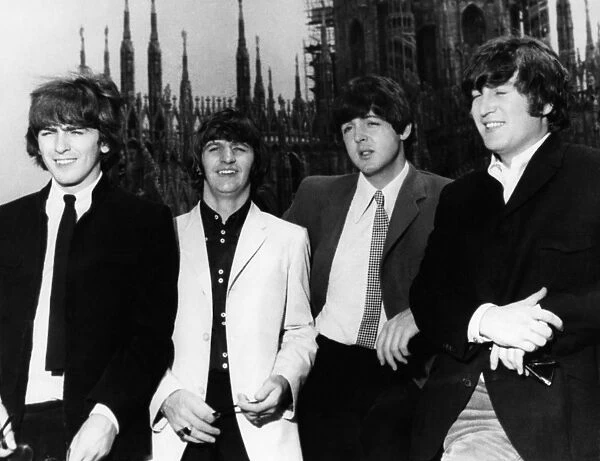The Beatles always had their antennae up for good songwriting material. Considering it was the 1960s and social boundaries were loosening at a rapid pace, they often came across some characters that were quite unique and deserving of being memorialized in song.
With “Polythene Pam,” part of the long medley on Side Two of Abbey Road in 1969, John Lennon created a composite of two people he’d encountered during his time in the group. Lennon then embellished a bit with his imagination to create a memorable, succinct snapshot.
Medley Material
After The Beatles closed out the recording of the material for their Let It Be album with their 1969 rooftop concert, they didn’t want to deal with collecting and editing all the material. They decided to shelve it and go right back into the studio to record a more traditional album that would become Abbey Road, the final LP they would make together.
With “Polythene Pam,” part of the long medley on Side Two of Abbey Road in 1969, John Lennon created a composite of two people he’d encountered during his time in the group. Lennon then embellished a bit with his imagination to create a memorable, succinct snapshot.
Medley Material
After The Beatles closed out the recording of the material for their Let It Be album with their 1969 rooftop concert, they didn’t want to deal with collecting and editing all the material. They decided to shelve it and go right back into the studio to record a more traditional album that would become Abbey Road, the final LP they would make together.
Perhaps because they were coming back to the studio with relatively little downtime, they were more strapped for songs than usual at the start of a record. That’s part of the reason why so much of the running time on the second side was devoted to a medley. Many of those songs weren’t quite finished, but, by combining them in their shortened form with others of the same type, The Beatles turned a problem into a triumph.
“Polythene Pam” is one of those songs. John Lennon had written it for inclusion on The White Album, but it didn’t make the cut there. With a need for material on Abbey Road, the song, which featured only two verses without a chorus, proved perfect for the kind of stitching-together process the band would be using. The end of the song would run right into “She Came In Through the Bathroom Window,” so the group recorded both songs tog
ether.
As for the origins of “Polythene Pam,” Lennon took the name from a woman The Beatles knew from Liverpool who went by the nickname “Polythene Pat,” an appellation she earned because she loved the material so much that she ate it. Meanwhile, the actions of the protagonist in the song were based on a girl he met through a mutual acquaintance, as he explained to interviewer David Sheff:
“I met him when we were on tour and he took me back to his apartment and I had a girl and he had one he wanted me to meet. He said she dressed up in polythene, which she did. She didn’t wear jackboots and kilts, I just sort of elaborated. Perverted sex in a polythene bag. Just looking for something to write about.”
Exploring the Lyrics of “Polythene Pam”
Lennon doesn’t get too fat into the details of Pam’s personality in the song. That’s probably because the narrator isn’t really concerned about all that. The fact that Lennon sings the track with a bit of a lecherous tone in his voice is a giveaway to his intentions.
Well, you should see Polythene Pam, he begins. She’s so good-looking but she looks like a man, which seems like a nod to the androgynous nature of the era’s fashion. Well, you should see her in drag, dressed in her polythene bag, Lennon continues. Again, there’s no mention of anything else but her physical traits.
The second verse continues in that vein: Get a dose of her in jackboots and kilt / She’s killer-diller when she’s dressed to the hilt. Lennon them compares her to the models he sees in the tabloid rags: She’s the kind of a girl that makes the News of the World / You could say she was attractively built.
That’s all we hear about Pam, although the group did mention her briefly as working in a shop in “Mean Mr. Mustard,” which also appears on Side Two of Abbey Road. And maybe it’s fitting that we don’t know too much about her, since the two people who inspired her clearly made quite an impression on John Lennon, although maybe not a lasting one.




